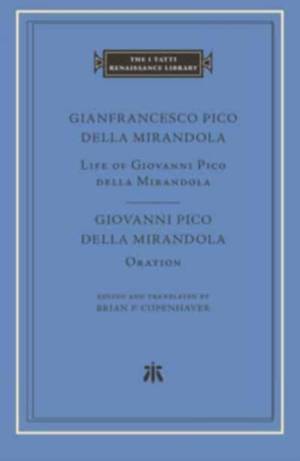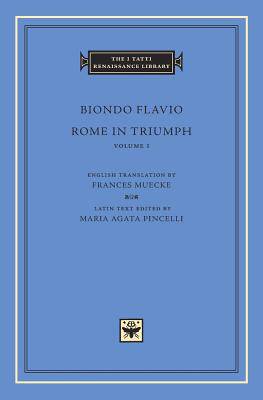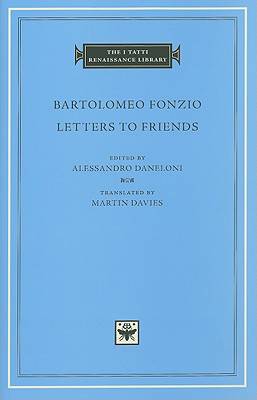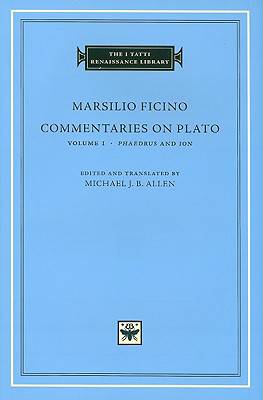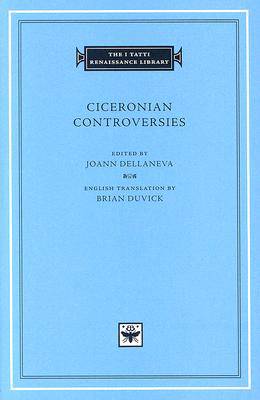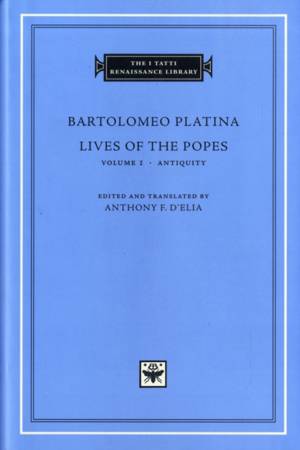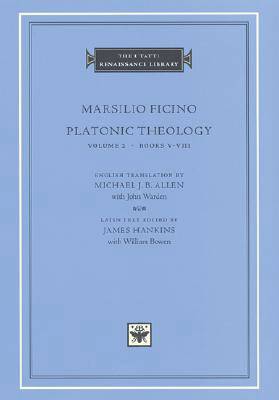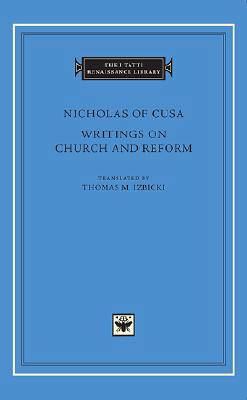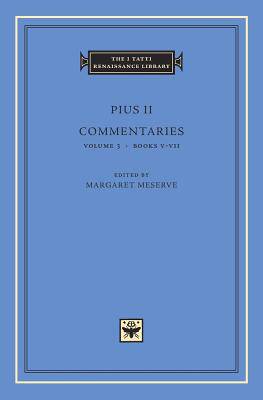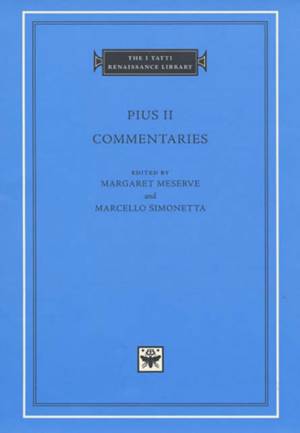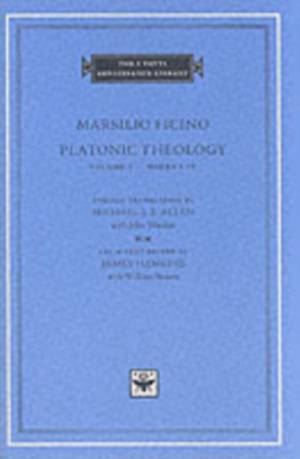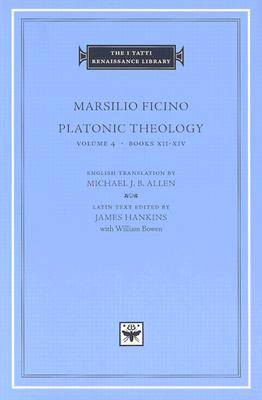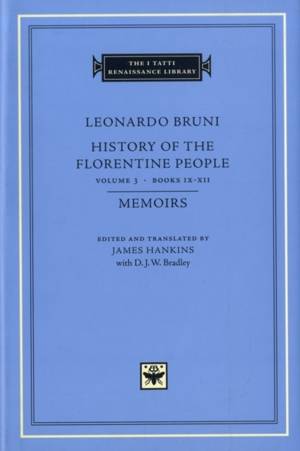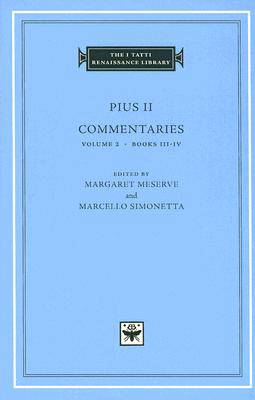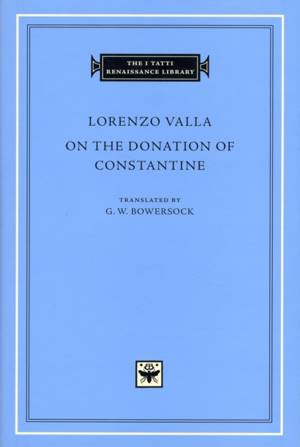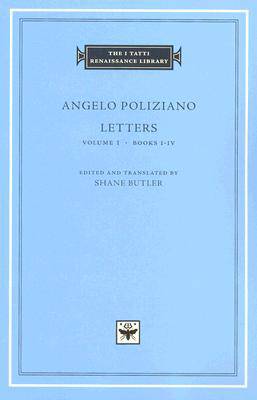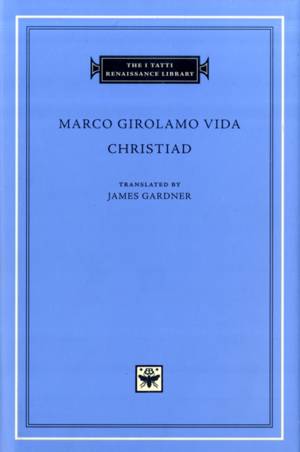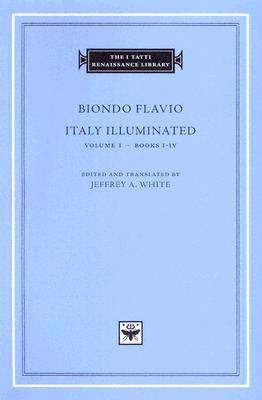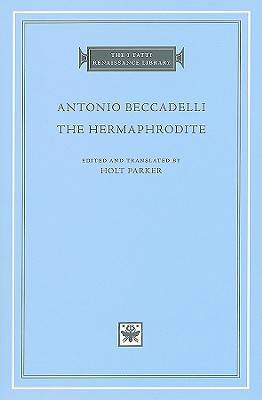
- Retrait gratuit dans votre magasin Club
- 7.000.000 titres dans notre catalogue
- Payer en toute sécurité
- Toujours un magasin près de chez vous
- Retrait gratuit dans votre magasin Club
- 7.000.0000 titres dans notre catalogue
- Payer en toute sécurité
- Toujours un magasin près de chez vous
-
Life of Giovanni Pico della Mirandola. Oration
Gianfrancesco Pico della Mirandola, Giovanni Pico della Mirandola
- Livre relié | Anglais | The I Tatti Renaissance Library
- The Oration by philosopher Giovanni Pico della Mirandola (1463–1494), to which later editors added the subtitle On the Dignity of Man, is the most fam... Savoir plus
45,95 €Livraison 1 à 2 semaines45,95 €Livraison 1 à 2 semaines -
Selected Letters, Volume 1
Francesco Petrarca
- Livre relié | Anglais | The I Tatti Renaissance Library
- Francesco Petrarca (1304–1374), one of the greatest of Italian poets, was also the leading spirit in the Renaissance movement to revive the cultural a... Savoir plus
45,95 €Livraison 1 à 2 semaines45,95 €Livraison 1 à 2 semaines -
Rome in Triumph, Volume 1
Biondo Flavio
- Livre relié | Anglais | The I Tatti Renaissance Library
- Biondo Flavio was a pioneering figure in the Renaissance discovery of antiquity and popularized the term Middle Age to describe the period between the... Savoir plus
45,95 €Livraison 1 à 2 semaines45,95 €Livraison 1 à 2 semaines -
Letters to Friends
Bartolomeo Fonzio
- Livre relié | Anglais | The I Tatti Renaissance Library
- The letters of Bartolomeo Fonzio—a leading literary figure in Florence of the time of Lorenzo de’ Medici and Machiavelli—are a window into the world o... Savoir plus
45,95 €Livraison 1 à 2 semaines45,95 €Livraison 1 à 2 semaines -
Invectives
Francesco Petrarca
- Livre relié | Anglais | The I Tatti Renaissance Library
- Francesco Petrarca (1304–1374), one of the greatest Italian poets, was also a leader in the Renaissance movement to revive ancient Roman language and ... Savoir plus
45,95 €Livraison 1 à 2 semaines45,95 €Livraison 1 à 2 semaines -
Commentaries on Plato
Marsilio Ficino
- Livre relié | Anglais | The I Tatti Renaissance Library
- Marsilio Ficino (1433–1499), the Florentine scholar-philosopher-magus, was largely responsible for the Renaissance revival of Plato. This volume conta... Savoir plus
45,95 €Livraison 1 à 2 semaines45,95 €Livraison 1 à 2 semaines -
Ciceronian Controversies
- Livre relié | Anglais | The I Tatti Renaissance Library
- The main literary dispute of the Renaissance pitted those Neo-Latin writers favoring Cicero alone as the apotheosis of Latin prose against those follo... Savoir plus
45,95 €Livraison 1 à 2 semaines45,95 €Livraison 1 à 2 semaines -
Lives of the Popes
Bartolomeo Platina
- Livre relié | Anglais | The I Tatti Renaissance Library
- Imprisoned for conspiring against Pope Paul II, Platina (1421–1481) returned to favor under Pope Sixtus IV, and composed this biographical compendium ... Savoir plus
45,95 €Livraison 1 à 2 semaines45,95 €Livraison 1 à 2 semaines -
Platonic Theology
Marsilio Ficino
- Livre relié | Anglais | The I Tatti Renaissance Library
- Platonic Theology is the visionary and philosophical masterpiece of Marsilio Ficino (1433–1499), the Florentine scholar-philosopher-magus largely resp... Savoir plus
45,95 €Livraison 1 à 2 semaines45,95 €Livraison 1 à 2 semaines -
Writings on Church and Reform
Nicholas of Cusa
- Livre relié | Anglais | The I Tatti Renaissance Library
- Nicholas of Cusa (1401–1464), a student of canon law who became a Catholic cardinal, was widely considered the most important original philosopher of ... Savoir plus
45,95 €Livraison 1 à 2 semaines45,95 €Livraison 1 à 2 semaines -
Commentaries
Pius II
- Livre relié | Anglais | The I Tatti Renaissance Library
- Commentaries by Pius II (1405–1464)—the only autobiography ever written by a pope—was composed in elegant humanistic Latin modeled on Caesar and Cicer... Savoir plus
45,95 €Livraison 1 à 2 semaines45,95 €Livraison 1 à 2 semaines -
Commentaries
Pius II
- Livre relié | Anglais | The I Tatti Renaissance Library
- The Commentaries of Pius II (1405-1464), the only autobiography ever written by a pope, was composed in elegant humanistic Latin modeled on Caesar and... Savoir plus
45,95 €Livraison 1 à 2 semaines45,95 €Livraison 1 à 2 semaines -
Famous Women
Giovanni Boccaccio
- Livre relié | Anglais | The I Tatti Renaissance Library
- Giovanni Boccaccio (1313–1375) devoted his last decades to compiling encyclopedic works in Latin. Among them is Famous Women, the first collection of ... Savoir plus
45,95 €Livraison 1 à 2 semaines45,95 €Livraison 1 à 2 semaines -
Platonic Theology
Marsilio Ficino
- Livre relié | Anglais | The I Tatti Renaissance Library
- Platonic Theology is the visionary and philosophical masterpiece of Marsilio Ficino (1433–1499), the Florentine scholar-philosopher-magus largely resp... Savoir plus
45,95 €Livraison 1 à 2 semaines45,95 €Livraison 1 à 2 semaines -
Platonic Theology
Marsilio Ficino
- Livre relié | Anglais | The I Tatti Renaissance Library
- Platonic Theology is the visionary and philosophical masterpiece of Marsilio Ficino (1433–1499), the Florentine scholar-philosopher-magus largely resp... Savoir plus
60,95 €Livraison 2 à 3 semaines60,95 €Livraison 2 à 3 semaines -
History of Venice
Pietro Bembo
- Livre relié | Anglais | The I Tatti Renaissance Library
- Bembo (1470–1547), a Venetian nobleman, later a cardinal of the Roman Catholic Church, was the most celebrated Latin stylist of his day and was widely... Savoir plus
45,95 €Livraison 1 à 2 semaines45,95 €Livraison 1 à 2 semaines -
History of the Florentine People
Leonardo Bruni
- Livre relié | Anglais | The I Tatti Renaissance Library
- Bruni (1370-1444) was the best-selling author of the 15th century, and this book is generally considered the first modern work of history. This volume... Savoir plus
35,96 €Livraison 1 à 2 semaines35,96 €Livraison 1 à 2 semaines -
Commentaries
Pius II
- Livre relié | Anglais | The I Tatti Renaissance Library
- The Renaissance popes were among the most enlightened and generous patrons of arts and letters in the Europe of their day. Commentaries, the only auto... Savoir plus
45,95 €Livraison 1 à 2 semaines45,95 €Livraison 1 à 2 semaines -
On the Donation of Constantine
Lorenzo Valla
- Livre relié | Anglais | The I Tatti Renaissance Library
- Valla (1407-1457) was the most important theorist of the humanist movement. His most famous work is the present volume, an oration in which Valla uses... Savoir plus
45,95 €Livraison 1 à 2 semaines45,95 €Livraison 1 à 2 semaines -
Letters
Angelo Poliziano
- Livre relié | Anglais | The I Tatti Renaissance Library
- Poliziano was one of the great scholar-poets of the Italian Renaissance. This volume illuminates his close friendship with Pico della Mirandola and in... Savoir plus
45,95 €Livraison 1 à 2 semaines45,95 €Livraison 1 à 2 semaines -
History of the Florentine People
Leonardo Bruni
- Livre relié | Anglais | The I Tatti Renaissance Library
- Bruni (1370–1444), the leading civic humanist of the Italian Renaissance, served as apostolic secretary to four popes (1405–1414) and chancellor of Fl... Savoir plus
45,95 €Livraison 1 à 2 semaines45,95 €Livraison 1 à 2 semaines -
Christiad
Marco Girolamo Vida
- Livre relié | Anglais | The I Tatti Renaissance Library
- Marco Girolamo Vida (1485–1566), humanist and bishop, came to prominence as a Latin poet in the Rome of Leo X and Clement VII. Leo commissioned this f... Savoir plus
45,95 €Livraison 1 à 2 semaines45,95 €Livraison 1 à 2 semaines -
Italy Illuminated
Biondo Flavio
- Livre relié | Anglais | The I Tatti Renaissance Library
- Flavio, humanist and historian, was a pioneering figure in the Renaissance recovery of classical antiquity. His Italia Illustrata, here for the first ... Savoir plus
45,95 €Date de disponibilité inconnue45,95 €Date de disponibilité inconnue -
The Hermaphrodite
Antonio Beccadelli
- Livre relié | Anglais | The I Tatti Renaissance Library
- The Hermaphrodite’s open celebration of vice, particularly sodomy, earned it public burnings, threats of excommunication, banishment to the closed sec... Savoir plus
45,95 €Date de disponibilité inconnue45,95 €Date de disponibilité inconnue





